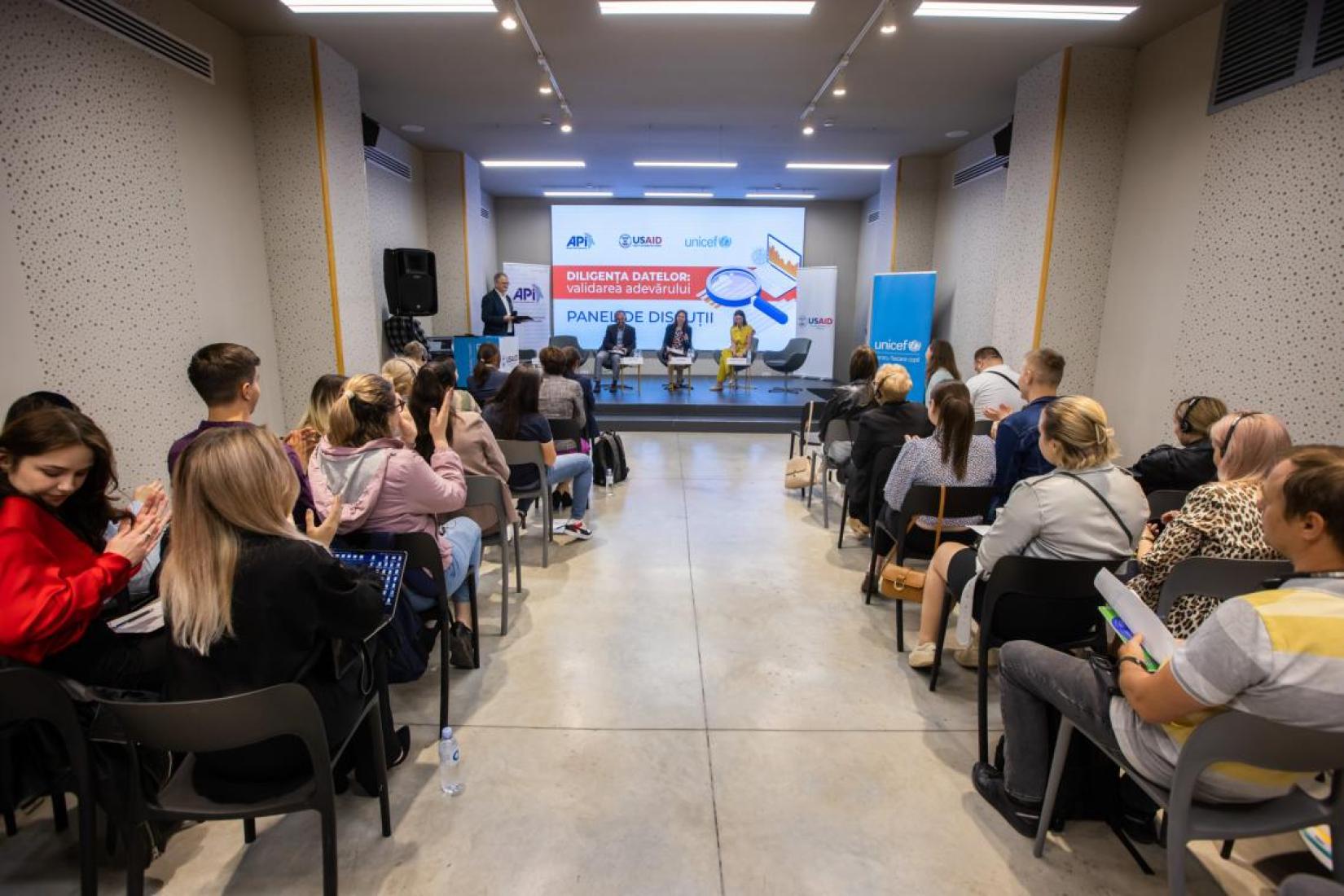Validation of Truth: Journalists united against misinformation
15 June 2023
- In partnership with API and with the support of USAID, UNICEF organized a panel discussion to enhance collaboration between journalists and public health experts in combating misinformation.

In addition to the loss of millions of lives, the COVID-19 pandemic has presented challenges in all areas of life and continues to provide valuable lessons for humanity. Misinformation regarding COVID-19, vaccination, and protective measures has become a common adversary for journalists, communication specialists, public health experts, and authorities.
Even though the pandemic is over, the fight against false information persists. To strengthen collaboration among all parties involved in providing accurate public health information, particularly during crises, UNICEF, in partnership with the Association of Independent Press and with the support of USAID, organized a panel discussion titled "Data Diligence: Validating the Truth." This event brought together numerous journalists, communication specialists from across the country, and public health experts, providing a unique opportunity to discuss challenges and strategies for combating the dissemination of fake news within society.
"Misinformation wielded immense influence within the Republic of Moldova. During the pandemic, the team of journalists from Stopfals.md, along with students and colleagues from other newsrooms, united to combat conspiracy theories.
Thanks to the donors, we trained journalists and students who subsequently collaborated to produce high-quality materials, providing accurate information to society. We also expanded the team of journalists responsible for debunking falsehoods, ensuring that credible information reaches local media institutions. We encourage collaboration and the development of partnerships to furnish accurate information," says Lilia Zaharia, API expert.
Elena Celak, a journalist at the Nokta.md media portal in Comrat, along with other regional journalists, shared the challenges of tackling false information about COVID-19, the vaccination process, the efforts to provide trustworthy information to the population, and the role of effective communication between media representatives and public health specialists.
"It is crucial for me to engage in discussions with other journalists and experts, exchanging experiences and opinions because there is an abundance of misinformation about COVID-19 and vaccination in Gagauzia. Many people still believe that such viruses do not exist. I am grateful for this opportunity to discuss and learn new fact-checking methods. Support is vital to understanding that we have ample reasons not give up and to persist in fighting against myths. As colleagues from Balti and Chisinau have mentioned, this problem persists in all regions of the country, and it is worth working together to create new tools and joint information campaigns to educate people in accessing information."
Nelly Uncuță, a journalist from the Esp.md portal in Bălți municipality:, "We, as regional journalists, have our specific problems. This event allowed us to delve deeper into the issues we face in the region. Misinformation is not just about COVID-19; it goes beyond that. Many people listen to their neighbors, and in the media, you see opinions from people who are not experts in the field. The most serious issue is that questions are not directed to experts or official representatives to obtain accurate answers. One of our obligations as journalists is to learn, develop alongside those who have knowledge, and fight against false information."
During the panel discussion, Alina Timotin, a specialist from the School of Public Health Management, presented valuable insights into the developments and impact of misinformation on the immunization process and the type of COVID-19 information consumers in the online environment. These data are crucial for developing public communication strategies. Additionally, participants at the event learned about the consequences of false information on the immunization process in Georgia, presented by Maiko Ratiani from the Media Development Foundation. This platform has extensive experience combating speculation in the Georgian public space, including during the COVID-19 pandemic. Journalists from Chisinau and students from the Faculty of Journalism at the Moldovan State University also highlighted the issues faced during the pandemic and stressed the importance of continuous dialogue in combating misinformation in crises.
"The pandemic caught us unprepared to communicate in crises. From the beginning, we didn't fully grasp the gravity of this problem, and views and audience numbers were more important than what we needed to convey. As more information about COVID-19 and vaccination emerged, journalists who consistently covered this topic gained a better understanding and addressed it more accurately. However, the media in the Republic of Moldova gave significant emphasis to involving people with no connection to the field of public health, which later affected the immunization process. The role of journalists was and continues to be providing evidence-based information in simple language. A significant issue during this pandemic was finding experts who could explain the pandemic in a straightforward manner," said Elena Cioina, the editorial coordinator of the E-Sănătate.md platform.
"These discussions among journalists have the power to change certain opinions. For example, I expressed my disagreement on a particular subject, but through their arguments and previous experiences, my colleagues influenced my perception and helped me see a different approach. Similarly, as someone who works extensively in the field compared to other journalists, I can share different perspectives that may be interesting for them. The exchange of experiences and opinions is very useful and important for us," mentioned Elena Covalenco, a photojournalist at the IPN news agency.
"It is important to participate in such events to combat disinformation, which is quite prevalent in the media in the Republic of Moldova and internationally. This event provided us with more tools to debunk fake news and verify information. Likewise, we had the opportunity to interact with journalists who already have experience in this field," says Vasile Lipceanu, a journalism student.
Myths surrounding COVID-19 and the vaccination process quickly spread through various communication channels in the Republic of Moldova following the confirmation of the first cases of the disease. In response to this situation, UNICEF took immediate action to support national authorities in combating misinformation. They collaborated with the Independent Press Association and received assistance from donors such as USAID. Together, they implemented the project "Empowering Journalists from Regional Media and Journalism Students and Enhancing the Information Resilience of the Public."
As part of this project, a series of training sessions were conducted in Chisinau, Comrat, Cahul, and Balti. These sessions aimed to educate 73 journalists on effective fact-checking methods, reliable sources, and various tools that journalists can utilize to provide accurate and trustworthy information. By equipping journalists with these skills, UNICEF and its partners aimed to strengthen the quality of journalism and counter the proliferation of misinformation. Furthermore, the Association of Independent Press, with the support of UNICEF and USAID, developed an interactive digital tool called the "ABC of Disinformation." This tool was designed to assist information seekers in researching and verifying information in the public domain. By providing easy access to reliable resources and fact-checking methods, the "ABC of Disinformation" aimed to empower individuals to make informed decisions based on accurate information. Through these collaborative efforts, UNICEF, in partnership with the Independent Press Association and with the assistance of donors like USAID, made significant strides in countering misinformation surrounding COVID-19 in the Republic of Moldova. By educating journalists, enhancing fact-checking capabilities, and developing digital tools, they aimed to promote the dissemination of accurate and reliable information, thereby safeguarding public health and well-being.
UNICEF thanks the United States Agency for International Development (USAID) for their support in developing the capacities of journalists, communicators, and public health specialists to combat misinformation and promote healthy practices in informing the people of Moldova.



